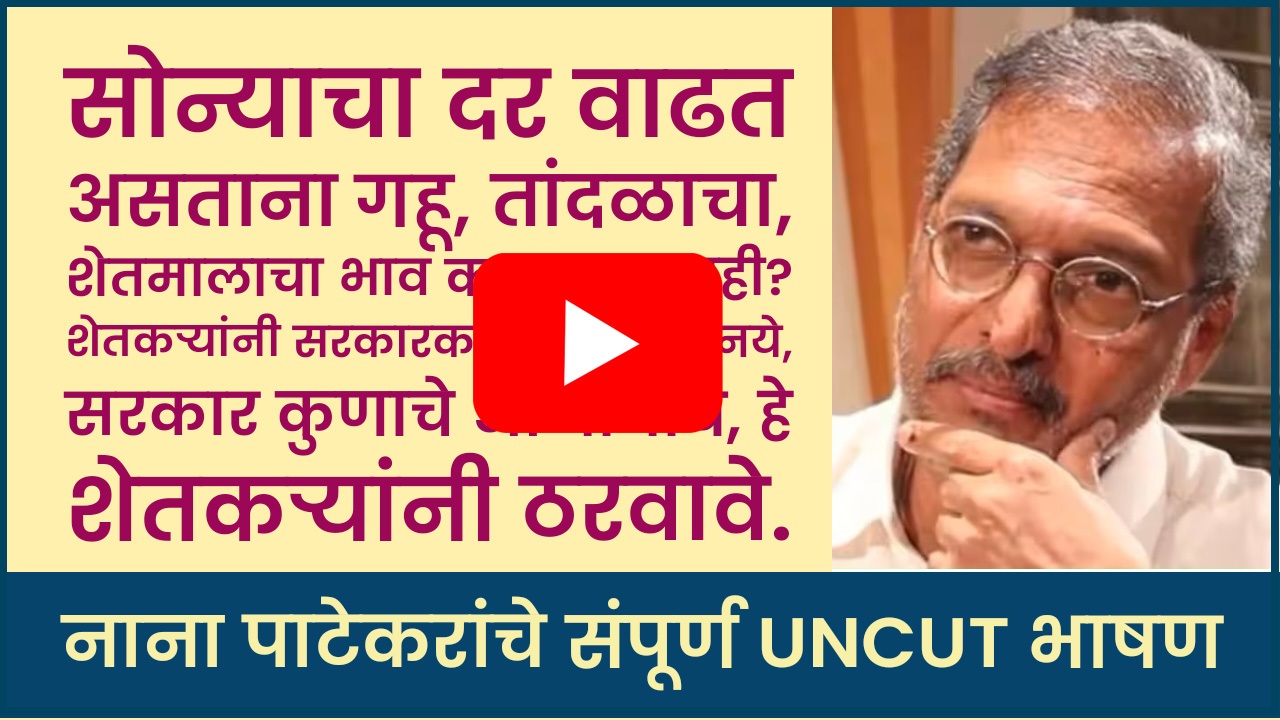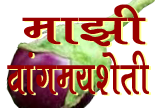
 नमस्कार ! नमस्कार !  बळीराजावर आपले स्वागत आहे. |
बळीराजा डॉट कॉमवर वाचा
आजचे बाजारभाव
आजचे बाजारभाव पाहण्यासाठी https://www.baliraja.com/node/3024 या लिंकवर क्लिक करा.
What went wrong with Independence? chapter - 5 - Sharad Joshi
योद्धा शेतकरी

What went wrong with Independence? chapter - 5
Independence snuffs liberalism.
From the beginning of the 18th century Europe and in particular England, witnessed the rise of a new liberal thought. Locke, Adam Smith, Mill, Spencer and other philosopher-thinkers, put forward a new world-view on human societies: Man evolved from tribal societies, human being as an individual is gradually evolving. The freedom of the individual is of central importance, the purpose of the society is to effort the individual protection of life, liberty and property. The state has only such powers as are specifically given it by citizens. The liberals offered a challenge to both the monarchy and church. If at all there exists something like the final truth in this universe, no one is likely to perceive it at any point of time. Ordinary human beings perceiving their natural instincts, committing mistakes and mending them carry forward the pursuit of knowledge of the universe; any intervention by a dictator, by a government is against nature and hence harmful. Government is no doubt necessary but its power must be clearly defined by law, all individuals should be equal before law. Individual is not for the society, the society is for the convenience of the individual.
Towards the end of the 19th century the nationalists and the socialists defeated the liberals who were articulating these views. A remarkable thing is that the European nations which saw, how so ever briefly, a liberal interlude did not fall to dictatorship of any type.
With the arrival of British in India the winds of liberalism started arriving on India’s shores. Mill and Spencer influenced most social reformers contemporary of Agarkar. What is the character of this society? How do the customs arise? Which scripture ordains them? What right does the society possess to make the lives of innumerable young widows an unending misery? By what right does the society impose on a whole caste revolting work like carrying human excreta and to treat them as untouchables to boot? Forbids them all education and even entry in the temples? By what right are young widows pushed into burning fires along with the dead bodies of their husbands?
Social reformers in the first generation put in lime light the woes and pleasures of individuals drawing the connotations that society exists for the happiness of the individuals and not the other way round. Unfortunately this tender sapling of liberalism had difficulty in finding roots in the arid and rocky terrain of India. Most leaders of the community stood up to beat back the tide of liberalism. They raised hue and cry that the social reformers were irreligious and anti-religions. Even a progressive like Lok Manya Tilak opposed the Bill on age of consent fixing the minimum age for girls at marriage at twelve. His argument was the issue is not age of consent the issue is, do you accept the intervention of an alien government. Scriptures, religions, social institutions and their prestige was held to be far more important than the life and happiness of mere individuals. Some tried to plagiarise the institutions of the conquerors both the British and Muslims by introducing community prayers and worship. Arya samaj, Prarthana samaj and a number of similar institutions that came up, made no attempts to touch issues of social inequality and emphasised community action. Vivekanand and such others emphasised religion and nation; and Mahatma Gandhi tried to bring together politics and spiritualism.
What was the net out come of these various streams of thoughts? Lok Manya Tilak wrote about Spencer in 1896, “Our scripture contain a far more developed presentation of agnosticism than Mr. Spencer has been able to manage.” Therefore, preaching us on the basis of Spencer is like carrying coal to new castle.
Any one who referred to any book of foreign origin was attacked as being a traitor and lackey of the British. And any orthodox fundamentalist who spoke against the English, qualified to be called a patriot for that reason alone. Agarkar, Jyotiba Phule, Ranade, Gokhale were all condemned as agents of British, unworthy of any attention. Liberalism upholding the individual right lost. Collectivism upholding community triumphed. The political platform of India’s freedom movement opposed the social reforms rejected the concerns of an individual has against the cult of personality, collectivism and cult of sacrosanct scriptures. Mahatma Gandhi called himself an anarchist, many of his quotations on the importance of individual liberty are well known. All the same the over all effect of Gandhian cult was to down grade the common individual and uphold collectivism, scriptures and traditional heroes.
In ancient times the Vedanta school of Indian philosophy had revolted massively against the collectivism in social practices and worship sanctified by the Vedas. It postulated identity between the individual consciousness and the cosmic presence and repudiated the need or the possibility of any intermediary between the two. This revolt was crushed by the Vedic Brahmins. Upanishads, the scriptures of Vedanta were assimilated to Vedas themselves. Thus supplanting their very existence. After the fall of Vedant philosophy it were the British who brought to India a world-view that put the individual at the epicentre of the universe. It was beaten back by the Vedic leaders who succeeded in mobilising common citizens against the champions of the common man. Jyotiba phule remained confined to three talukas of Pune district. Agarkar was crushed by the burden of his task and died at an early age. Ambedkar was disdained by the society and hence turned to Marxism, Buddhism and collectivism.
In the post-independence era the domination of the political institutions and the upper classes intensified a system that was euphemistically titled socialism. In practice, the economic system that developed after independence had no theoretical basis, measures were taken according to need of the situations and the demands of times in the light of influence of individuals, groups and organisations. But the situation was such that, with a few minor exceptions all significant groupings were in favour of consenting power in the government and bureaucracy. Non believed that the economic instincts of the individuals and a profit instinct of individuals and institutions in the private sectors could be mobilised to develop a rapidly developing economy. Those who thought so dare not speak not for fear of being mocked at and ridicule. No sooner did any one dare to suggest a more significant role by the private sector then he was attacked by the spokesman of capitalist’s agent of American imperialism, a profiteer etc. A few economists raised question on the concept and moralities of planning. They found themselves isolated. Forces favouring concentration of power in the government and bureaucracy were so strong that many protesters were sidelined and excluded from all appointments on governmental committees, educational, research institutions etc. Those who fell in line were quickly and sumchusly rewarded by conferment of diverse facilities, posts and honours. many an economists worked hard to pile up statistics and data on this problem and that to prepare learned memoranda proposing enlargement of the state activity. They were certain to be promptly rewarded by endowment, grants, posts and honours. In the early dawn of India’s independence the liberalism was totally eclipsed. Every one around was a collectivist. No wonder India fell victim to the epidemic of socialism. Even after the fall of socialism we all continue to be followers of collectivism and give scan to regard to the common man his instincts, pleasures and pains. If this domination of collectivism prevails it will take the nation here after a Fascist nazi type of dictatorship after having ruined 50 years of independence. Unknowingly we are walking into a nazi quagmire the same way we fell into the socialist morals.
- Sharad Joshi
----------------------------------------------------------------------------------------------------------------------------

- आपली प्रतिक्रिया लिहिण्यासाठी Log in (प्रवेश करा) किंवा register (नवीन खाते बनवा)
- 3125 वाचने



 एकूण भेटी
एकूण भेटी




